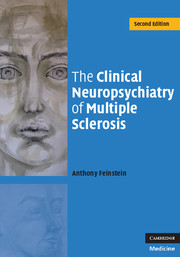Book contents
- Frontmatter
- Contents
- Acknowledgement
- Foreword
- 1 Multiple sclerosis: diagnosis and definitions
- 2 Depression: prevalence, symptoms, diagnosis and clinical correlates
- 3 Depression: etiology and treatment
- 4 Multiple sclerosis, bipolar affective disorder and euphoria
- 5 Multiple sclerosis and pseudobulbar affect
- 6 Multiple sclerosis and psychosis
- 7 Cognitive impairment in multiple sclerosis
- 8 The natural history of cognitive change in multiple sclerosis
- 9 Cognitive impairment in multiple sclerosis: detection, management and significance
- 10 Neuroimaging correlates of cognitive dysfunction
- 11 Multiple sclerosis, disease-modifying treatments and behavioral change
- 12 Multiple sclerosis: a subcortical, white matter dementia?
- Index
- Plate section
- References
7 - Cognitive impairment in multiple sclerosis
Published online by Cambridge University Press: 13 August 2009
- Frontmatter
- Contents
- Acknowledgement
- Foreword
- 1 Multiple sclerosis: diagnosis and definitions
- 2 Depression: prevalence, symptoms, diagnosis and clinical correlates
- 3 Depression: etiology and treatment
- 4 Multiple sclerosis, bipolar affective disorder and euphoria
- 5 Multiple sclerosis and pseudobulbar affect
- 6 Multiple sclerosis and psychosis
- 7 Cognitive impairment in multiple sclerosis
- 8 The natural history of cognitive change in multiple sclerosis
- 9 Cognitive impairment in multiple sclerosis: detection, management and significance
- 10 Neuroimaging correlates of cognitive dysfunction
- 11 Multiple sclerosis, disease-modifying treatments and behavioral change
- 12 Multiple sclerosis: a subcortical, white matter dementia?
- Index
- Plate section
- References
Summary
That most perceptive of behavioral neurologists, Charcot (1877), observed that MS patients may show “marked enfeeblement of the memory, conceptions are formed slowly and intellectual and emotional faculties are blunted in their totality.” Despite this early recognition of potential cognitive difficulties in MS patients, for the greater part of a century clinicians held to the belief that cognitive difficulties were seldom part of the clinical picture in MS, and if present, generally confined to patients with severe physical disability. Therefore, on the basis of a clinical examination, Kurtzke (1970) estimated that cognitive difficulties affected less than 5% of patients. Even more striking were the conclusions from the influencial study of Cottrell and Wilson (1926) of 100 MS patients seen in a tertiary referral center. Noting intellectual decline in only two patients, the authors considered the problem “minimal and negligible.”
With the advent of MRI in the early 1980s, clinicians and researchers were able to visualize the brain's white matter changes with a new found clarity. The ability to detect cerebral lesions in vivo was the impetus for researchers to look for clinical correlates, be they neurological or related to mentation, and MS became attractive to researchers as the prototypical subcortical, white matter dementing process. However, first the prevalence and nature of cognitive changes had to be re-examined, using the more sensitive methods of neuropsychological testing.
- Type
- Chapter
- Information
- The Clinical Neuropsychiatry of Multiple Sclerosis , pp. 115 - 144Publisher: Cambridge University PressPrint publication year: 2007



